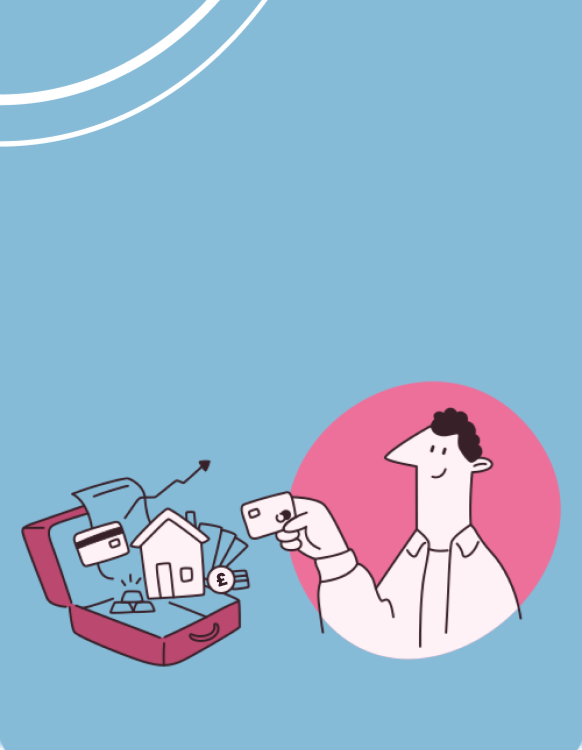
What is a Secured Loan?
A secured loan is a type of loan that is backed by collateral, which is an asset you own, such as a home or a car. This collateral reduces the lender’s risk, making secured loans generally easier to qualify for and offering lower interest rates compared to unsecured loans.

What are the benefits of choosing a Secured Loan?
Low Risk
Secured loans are considered less risky for lenders because they have collateral as security. This reduced risk often translates into lower interest rates for borrowers.
Larger Amounts
Secured loans typically allow you to borrow large sums of money compared to unsecured loans. This can be especially useful for significant expenses like home renovations or buying a car.
Monthly Payments
Secured loans often come with longer repayment terms, resulting in more manageable monthly payments. This can make it easier to budget and meet your financial obligations.
Things to consider before taking out a Secured Loan:
Before taking out a secured loan, consider:
- Collateral Risk:
It’s important to realise that if you are unable to make the required loan payments, you risk losing the collateral you used to secure the loan, which could include assets like your home. Interest Rates:
While secured loans generally have lower interest rates, it’s essential that your provider compares offers from various lenders to ensure you’re getting an affordable rate.Repayment Terms:
Longer loan terms may lead to lower monthly payments but can result in paying more interest over time.- Financial Stability:
We assess your ability to make consistent payments throughout the loan term to avoid potential collateral loss.



What do I need to get a Secured Loan?

Collateral
An asset, such as a home or vehicle, that you can use as security.

Loan Application
Click on the “Get a quote” button below, and fill out a short online form. Your request will be sent to us, and we will commence processing your application.

Credit Check
After you submit your request, we will assess your credit history to determine your eligibility and establish the terms of your loan.

Proof of Income
Next, you will have to provide evidence of your income and employment status.

Valuation of Collateral
For real estate loans, you might have to provide an appraisal to determine the collateral’s value.

Collateral
An asset, such as a home or vehicle, that you can use as security.

Loan Application
Click on the “Get a quote” button below, and fill out a short online form. Your request will be sent to us, and we will commence processing your application.

Credit Check
After you submit your request, we will assess your credit history to determine your eligibility and establish the terms of your loan.

Proof of Income
Next, you will have to provide evidence of your income and employment status.

Valuation of Collateral
For real estate loans, you might have to provide an appraisal to determine the collateral’s value.
The lady who I spoke to was brilliant. She was lovely and pleasant whilst being professional and fully informative. She was not pushy at all. She certainly had the right attitude and was engaging. If everyone was like her it would be perfect.

Christine Notley
This was the easiest transaction I’ve had in a long time, the customer service was amazing and very helpful and nice to talk with, would highly recommend the company to friends family etc, fantastic customer service. 5 stars from me.

Zoe Mary Hall
Mr Gower was very professional and found the right cover for me. He was polite and engaged in conversation, explained everything easily.

Callum Dobson

Frequently Asked Questions
Yes, secured loans can be more accessible because they consider the value of the asset used as collateral. This makes them a viable option for individuals with a poor credit score, and they often allow you to borrow larger amounts.
The required credit score can vary depending on the lender. In some cases, you may secure a loan even with a poor credit score. However, having a good credit score will help you access better interest rates, resulting in a more cost-effective loan.
The ability to pay off a secured loan early depends on your loan provider. Some lenders might charge an early repayment fee, so it’s essential to check the terms and conditions.
An unsecured loan carries less risk because it doesn’t require collateral. However, for individuals who need a substantial loan amount and are confident in their ability to make repayments, a secured loan might be a more suitable choice. Additionally, consider the Annual Percentage Rate (APR) offered by your lenders; a secured loan with a lower APR might be a better option than an unsecured loan with a high APR.
If you prefer not to take out a homeowner loan, several alternatives are available:
- Unsecured loan: This personal loan doesn’t require collateral for approval. While it doesn’t put your home at risk, you may not be able to borrow as much, and the APR might be higher.
- Credit card: If you can repay the money relatively quickly, a credit card might be a viable option. Look for 0% or low-interest deals to avoid high-interest charges.
- Remortgage: If you have an existing mortgage and have built up equity, you could consider remortgaging instead of taking out a second secured loan. This involves increasing and sometimes extending your existing mortgage term to release the needed funds.
Yes, secured loans can be more accessible because they consider the value of the asset used as collateral. This makes them a viable option for individuals with a poor credit score, and they often allow you to borrow larger amounts.
The required credit score can vary depending on the lender. In some cases, you may secure a loan even with a poor credit score. However, having a good credit score will help you access better interest rates, resulting in a more cost-effective loan.
The ability to pay off a secured loan early depends on your loan provider. Some lenders might charge an early repayment fee, so it’s essential to check the terms and conditions.
An unsecured loan carries less risk because it doesn’t require collateral. However, for individuals who need a substantial loan amount and are confident in their ability to make repayments, a secured loan might be a more suitable choice. Additionally, consider the Annual Percentage Rate (APR) offered by your lenders; a secured loan with a lower APR might be a better option than an unsecured loan with a high APR.
If you prefer not to take out a homeowner loan, several alternatives are available:
- Unsecured loan: This personal loan doesn’t require collateral for approval. While it doesn’t put your home at risk, you may not be able to borrow as much, and the APR might be higher.
- Credit card: If you can repay the money relatively quickly, a credit card might be a viable option. Look for 0% or low-interest deals to avoid high-interest charges.
- Remortgage: If you have an existing mortgage and have built up equity, you could consider remortgaging instead of taking out a second secured loan. This involves increasing and sometimes extending your existing mortgage term to release the needed funds.







